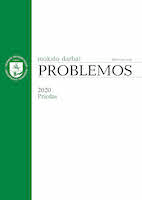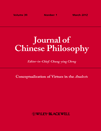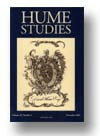
Journal of Speculative Philosophy
Scope & Guideline
Challenging Boundaries, Inspiring Ideas.
Introduction
Aims and Scopes
- Speculative Philosophy and Critical Theory:
The journal emphasizes speculative approaches to philosophy, often integrating critical theory to analyze social injustices, power dynamics, and cultural phenomena. - Interdisciplinary Connections:
It fosters interdisciplinary dialogue, drawing connections between philosophy, literature, sociology, and anthropology to enrich philosophical discourse. - Historical Contextualization:
Many articles investigate historical figures and movements, situating contemporary philosophical discussions within broader historical and cultural contexts. - Focus on Marginalized Perspectives:
The journal highlights voices and perspectives from marginalized communities, particularly in relation to issues of race, gender, and coloniality. - Innovative Methodologies:
It encourages innovative methodologies that challenge traditional philosophical frameworks, often employing phenomenology, deconstruction, and radical empiricism.
Trending and Emerging
- Decolonial Philosophy:
Recent publications increasingly explore decolonial thought, addressing the impacts of colonialism on philosophy and advocating for the inclusion of indigenous and marginalized perspectives. - Ethics and Activism:
There is a growing emphasis on the ethical implications of philosophical inquiry, particularly in relation to activism, social justice, and collective responsibility. - Intersections of Technology and Philosophy:
Emerging themes related to technology, artificial intelligence, and their philosophical implications reflect contemporary concerns about the future of humanity and ethical considerations in a technological age. - Embodiment and Phenomenology:
A resurgence of interest in embodiment and phenomenology highlights the significance of lived experience and the body in philosophical discussions, bridging gaps between theory and practice. - Environmental Philosophy and the Anthropocene:
There is an increasing focus on environmental issues and the Anthropocene, examining the philosophical dimensions of ecological crises and human-nature relationships.
Declining or Waning
- Traditional Analytic Philosophy:
There is a noticeable decline in papers that adhere strictly to traditional analytic philosophy, indicating a shift towards more speculative and critical approaches. - Western-Centric Philosophical Discussions:
The journal has moved away from predominantly Western philosophical discussions, reflecting a growing interest in non-Western philosophies and perspectives. - Purely Theoretical Constructs:
Themes focusing solely on abstract theoretical constructs without practical application or social relevance are less represented, as there is a stronger emphasis on applied philosophy and real-world implications. - Individualism in Philosophy:
The focus on individualistic philosophical approaches appears to be diminishing, as collective and relational perspectives gain traction in contemporary discourse. - Philosophy of Science:
There is a waning interest in traditional philosophy of science topics, which may suggest a broader trend towards integrating scientific inquiry with philosophical analysis rather than treating them as distinct domains.
Similar Journals

Journal of Japanese Philosophy
Exploring the Depths of Japanese ThoughtThe Journal of Japanese Philosophy, published by SUNY Press, serves as a pivotal platform for scholars and practitioners interested in the rich tapestry of Japanese philosophical thought. With its ISSN 2327-0195 and E-ISSN 2327-0209, this journal invites rigorous scrutiny and creative engagement with both traditional and contemporary philosophies emerging from Japan. While the journal does not currently offer Open Access options, it remains accessible through major academic libraries and databases. By fostering interdisciplinary dialogue, the Journal of Japanese Philosophy aims to illuminate various aspects such as aesthetics, ethics, politics, and environmental philosophy, contributing significantly to the broader field of philosophy. As a respected source of scholarship, it plays a critical role in shaping the understanding of Japanese philosophy within global contexts, making it an essential resource for researchers, professionals, and students alike.

INQUIRY-AN INTERDISCIPLINARY JOURNAL OF PHILOSOPHY
Engaging Perspectives in the Pursuit of KnowledgeINQUIRY - AN INTERDISCIPLINARY JOURNAL OF PHILOSOPHY, published by Routledge Journals, Taylor & Francis Ltd, stands as a pivotal platform for the exploration of philosophical discourse, particularly at the intersection of philosophy and health policy. With its ISSN 0020-174X and E-ISSN 1502-3923, this journal has been committed to open access since 2014, thereby fostering an inclusive environment for both dissemination and engagement in critical philosophical inquiry. Spanning its rich history from 1958 to 2024, INQUIRY is consistently recognized for its significant contributions, boasting a 2023 ranking of Q1 in Philosophy and Q2 in Health Policy, indicative of its scholarly impact and prestige. Currently, it ranks #69/806 in Arts and Humanities for Philosophy and #170/310 in Medicine for Health Policy, solidifying its role as a vital resource for researchers, professionals, and students committed to advancing knowledge across disciplines. The journal's address in Milton Park, Abingdon, UK, further embeds it within a robust academic community that champions interdisciplinary collaboration and innovation.

FILOZOFIA
Exploring the Depths of Thought and FaithFILOZOFIA is a prominent open-access journal published by the Institute of Philosophy of the Slovak Academy of Sciences and the Institute of Philosophy of the Czech Academy of Sciences. Since its inception in 2002, it has become a vital resource in the fields of Philosophy and Religious Studies, achieving a Q2 ranking in Philosophy and a Q1 ranking in Religious Studies as of 2023. With an ISSN of 0046-385X and an E-ISSN of 2585-7061, the journal delivers high-quality, peer-reviewed research accessible to a global audience following its transition to open access in 2020. Its commitment to scholarly excellence is reflected in its Scopus rankings, placing it in the top half of both fields with significant contributions to ongoing philosophical discourse. Researchers, professionals, and students alike benefit from the journal's dedication to fostering dialogues that challenge and expand the realms of philosophical inquiry and understanding.

Vestnik Sankt-Peterburgskogo Universiteta-Filosofiya i Konfliktologiya
Unveiling New Perspectives in Cultural and Religious StudiesVestnik Sankt-Peterburgskogo Universiteta-Filosofiya i Konfliktologiya is a prestigious academic journal published by ST PETERSBURG UNIV PRESS, focusing on the interdisciplinary exploration of philosophy, conflict studies, cultural studies, and religious studies. With its ISSN 2542-2278 and E-ISSN 2541-9382, this journal serves as a vital platform for researchers and scholars looking to disseminate their findings in these dynamic fields. The journal has shown impressive rankings in 2023, achieving Q1 status in Cultural Studies and Religious Studies, alongside Q2 in Philosophy and Q3 in Sociology and Political Science. This positioning, alongside its diverse publication scope since its convergence in 2017, underscores the journal's critical role in advancing scholarly dialogue and research. Though it operates under a closed access policy, the journal remains integral for professionals and students seeking rigorous academic discourse and insights into contemporary issues affecting philosophy and conflictology within a cultural context. Its influence and reach in the academic community contribute significantly to ongoing debates and studies, establishing it as an essential resource for anyone engaged in these disciplines.

Problemos
Elevating Research in the Heart of PhilosophyProblemos is an esteemed academic journal published by VILNIUS UNIV PRESS, dedicated to advancing research in the field of Philosophy. With an ISSN of 1392-1126 and E-ISSN 2424-6158, this open-access journal has been disseminating knowledge and fostering scholarly dialogue since 2005. Situated in Lithuania, Problemos has gained recognition, achieving a prestigious Q2 category ranking in the 2023 Philosophy category and a Scopus rank of #458 out of 806, placing it in the 43rd percentile. The journal covers a broad spectrum of philosophical inquiries, making it an essential resource for researchers, professionals, and students seeking to engage with contemporary philosophical discourse. By offering unrestricted access to its content, Problemos promotes the free exchange of ideas and encourages collaboration across disciplines, establishing itself as a pivotal platform within the academic community.

JOURNAL OF CHINESE PHILOSOPHY
Bridging Past and Present in Philosophical InquiryThe Journal of Chinese Philosophy, published by Brill, stands as a pivotal platform for the exploration and dissemination of research within the realm of philosophy, particularly focusing on traditional and contemporary Chinese thought. With a commitment to academic excellence, this journal has earned a reputation for its rigorous scholarship, as reflected in its Q2 category ranking in the field of Philosophy on Scopus, currently positioned at rank #337 out of 806 in Arts and Humanities. Since its inception in 1973, the journal has consistently engaged scholars, professionals, and students alike, featuring articles that deepen understanding and provoke critical discourse among various philosophical traditions. Although it is not open access, the journal's influential contributions and comprehensive reviews of emerging trends in Chinese philosophy make it an essential resource for anyone engaged in the study of this rich and diverse field. For subscription and access details, interested readers can refer to the publisher's website.

FILOZOFSKI VESTNIK
Cultivating Critical Perspectives in Religious StudiesFILOZOFSKI VESTNIK, published by ZRC PUBLISHING, is a notable academic journal based in Slovenia, dedicated to the exploration and analysis of philosophical and religious studies. With an ISSN of 0353-4510 and an E-ISSN of 1581-1239, this journal has been in continuous circulation since 2002, establishing itself as a critical platform for disseminating research within its field. Recognized in 2023 as a Q2 journal in Religious Studies within its category quartiles, FILOZOFSKI VESTNIK ranks #449 out of 644 in Scopus, reflecting its growing influence and contribution to the scholarly community, with a percentile ranking in the 30th. Although not an open-access journal, it remains accessible to a wide audience, fostering engagement and discourse among researchers, professionals, and students. The journal aims to publish high-quality articles that advance the understanding of philosophical dimensions in contemporary religious discourse, making it an invaluable resource for those invested in these critical fields of study.

Anales del Seminario de Historia de la Filosofia
Empowering Scholars Through Open Access KnowledgeAnales del Seminario de Historia de la Filosofia, published by UNIV COMPLUTENSE MADRID, SERVICIO PUBLICACIONES, is a distinguished open-access journal that has been contributing to the fields of History and Philosophy since 1980. With an ISSN of 0211-2337 and E-ISSN 1988-2564, it aims to provide a scholarly platform for the dissemination of original research and critical reviews pertinent to the historiography of philosophy and its influences on modern thought. The journal features a robust open-access model, ensuring that all published content is readily available to researchers, students, and professionals worldwide. The journal currently enjoys recognition within its field, classified within the Q3 quartile in History and Philosophy of Science and Q2 quartile in Philosophy as of 2023. Positioned within the heart of Spain, the journal facilitates international academic dialogue and invites submissions that explore the intersection of past philosophical contexts and contemporary issues. Whether you are a seasoned scholar or a budding philosopher, Anales del Seminario de Historia de la Filosofia aims to foster a deeper understanding of philosophical traditions and their ongoing relevance in today’s discourse.

Hume Studies
Charting New Territories in Humean AnalysisHume Studies, published by the Hume Society, is an esteemed journal dedicated to the exploration and analysis of the philosophical works of David Hume, offering a platform for scholars to engage with contemporary and historical interpretations of his thought. With an ISSN of 0319-7336 and E-ISSN 1947-9921, this journal plays a pivotal role in the field of philosophy, particularly focusing on Hume's influence on modern philosophical discourse. Although currently listed as a Q4 journal in the 2023 category of Philosophy in Scopus rankings, its contributions to the understanding of Humean philosophy remain invaluable for researchers and professionals alike, stimulating ongoing dialogue and critical inquiry within the academic community. Scholars can access the journal at Occidental College, Department of Philosophy, in Los Angeles, California, paving the way for innovative discussions that bridge historical and contemporary philosophical issues. While the journal operates under a subscription model, its significance in shaping philosophical thought ensures it is a vital resource for anyone engaged in serious philosophical study.

Topicos-Revista de Filosofia
Cultivating a Vibrant Community of Philosophical ThinkersTopicos-Revista de Filosofia, published by UNIV PANAMERICANA, DEPT FILOSOFIA, stands as a significant academic platform within the field of philosophy, actively contributing to scholarly discourse since 2006 through its open access model. With an ISSN of 0188-6649 and an E-ISSN of 2007-8498, this journal is dedicated to fostering critical thought and philosophical inquiry in both regional and global contexts. Operating out of Mexico City, it provides a vital avenue for researchers, professionals, and students to engage with contemporary philosophical issues, reflected in its ranking of Q3 in the 2023 category for Philosophy and its position within the 33rd percentile among over 800 peer journals in the field according to Scopus. Topicos not only prioritizes accessibility to philosophical scholarship but also aims to propel academic discussions and elevate the standards of philosophical research. With coverage extending from 2013 to 2024, it invites contributions that bridge diverse philosophical traditions and innovative thought pathways, reinforcing its role as an influential resource for the philosophical community.